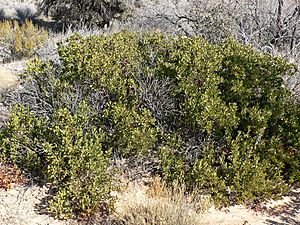Pointleaf manzanita facts for kids
Quick facts for kids Pointleaf manzanita |
|
|---|---|
 |
|
| Conservation status | |
| Scientific classification | |
| Kingdom: | |
| (unranked): | |
| (unranked): | |
| (unranked): | |
| Order: | |
| Family: | |
| Genus: | |
| Species: |
A. pungens
|
| Binomial name | |
| Arctostaphylos pungens Kunth
|
|
| Synonyms | |
|
Arctostaphylos chaloneorum |
|
Arctostaphylos pungens, also known as the pointleaf manzanita, is a type of manzanita plant. It grows naturally in the Southwestern United States and in northern and central Mexico. You can find it in areas with chaparral (dense shrubs) and woodlands, as well as on dry desert ridges. For example, it grows at Tent Rocks National Monument in New Mexico, often at high places around 6,000 feet (about 1,800 meters) above sea level.
Contents
What is Pointleaf Manzanita?
The pointleaf manzanita is an evergreen shrub. This means it's a bushy plant that keeps its leaves all year round. It usually grows upright and can spread out, reaching heights of one to three meters (about 3 to 10 feet).
Appearance of the Plant
This shrub has smooth, reddish bark that stands out. Its smaller branches and new leaves are a bit fuzzy, like they have a light woolly coating. The older, mature leaves are tough and shiny green. They are shaped like an oval or a wide spear, and can be up to 4 centimeters (about 1.5 inches) long.
Flowers and Fruit
The flowers of the pointleaf manzanita grow in round clusters. Each flower is shaped like a small urn or jar. After the flowers, the plant produces a fruit called a drupe. This fruit is round and measures about 5 to 8 millimeters (about 0.2 to 0.3 inches) across.
Where Does it Grow and Why is it Important?
Pointleaf manzanita is a valuable plant for many reasons. It provides food for various kinds of wildlife. People also use its fruit. In many parts of Mexico, the fruit is harvested and made into delicious jam.
Growing Conditions
This shrub prefers dry, shallow soils that have a lot of gravel and sand. It likes soil that is a bit acidic. To help it get enough nutrients and water, the plant forms a special partnership with tiny underground fungi called mycorrhizae. These fungi help the plant's roots absorb more from the soil.
How Seeds Grow
The seeds of the pointleaf manzanita need a special event to happen before they can sprout. They require something called scarification. This means their hard outer coating needs to be scratched or weakened. In nature, this often happens because of wildfires. The heat from a fire helps to break open the seed coat, allowing the seeds to germinate (start to grow).
See also
 In Spanish: Gayuba de México para niños
In Spanish: Gayuba de México para niños
 | Laphonza Butler |
 | Daisy Bates |
 | Elizabeth Piper Ensley |


